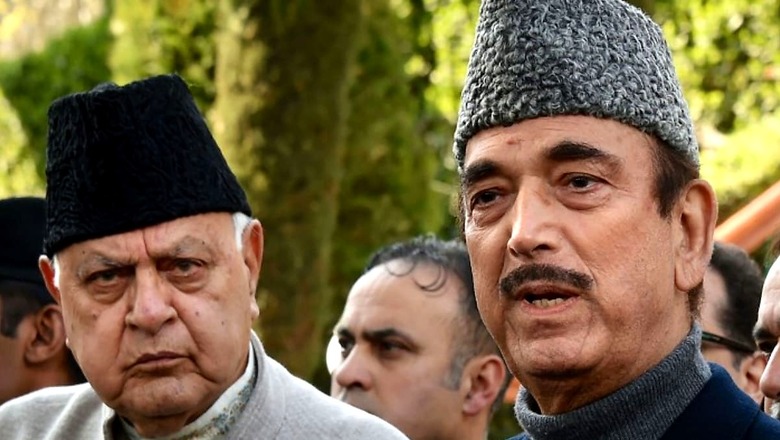
views
A rather interesting verbal spat, quite out of the blue, broke out earlier this week between Ghulam Nabi Azad and Farooq Abdullah. Both have served as chief ministers of Jammu and Kashmir, both have held important positions in the Union ministry, and both were once upon a time on the same side of the political divide (when Azad was a prominent leader of the Congress, his party and Abdullah’s National Conference were allies).
And, both have been friends. In his autobiography titled, ‘Azaad’, Ghulam Nabi Azad showered praise on Farooq Abdullah—calling him a truly secular leader and a nationalist—and backed his decision to quit as chief minister when Jagmohan was appointed the state’s governor. Azad also, more or less, absolved him of complicity or negligence when Kashmiri Pandits were targeted by Islamists.
But now, equations have changed. Azad has his own party which is in direct political conflict with the National Conference (NC). It should, therefore, not be surprising if the two men seek to target each other to score political brownie points. What is amazing, though, is the timing of the verbal assault, leading one to wonder what lies behind the action.
Azad has claimed that Farooq Abdullah and his son Omar Abdullah (for whom, one suspects, Azad does not have a high opinion), held late-night meetings with Prime Minister Narendra Modi and Union Home Minister Amit Shah. Farooq Abdullah was quick to deny the statement, saying that, if he wanted to meet them he would do it in broad daylight. He also added that perhaps Azad had his agents in the homes of the two leaders of the BJP, who fed him such rumours. Thereafter, Azad put out a clarification saying that he had received the information from his sources that the two National Conference leaders had sought to meet them late in the night.
The bizarre war of words did not end there. Azad accused the Abdullahs of saying “one thing in Srinagar, another in Jammu, and something else in Delhi”. On his part, Farooq lashed out in equally sharp language: “When no one wanted to give him [Azad] Rajya Sabha seat, I was the one who gave him…but today he is saying all this”. References were made to how Azad continued to occupy government accommodation, etc, despite holding no official position and after having long retired from Parliament.
What is one to make of this confrontation? It is true that Azad has a soft spot for the prime minister—something that became so starkly evident, perhaps for the first time, during the occasion when he gave his farewell speech in the Rajya Sabha in February 2021. Since then, while Azad has been vocal about his opposition to many issues, including the abrogation of Article 370, he has been careful with his words when it comes to outright condemnation of the prime minister or even the BJP. In his autobiography too, he has praised Modi on more than one occasion.
It is also true that rumours of late have begun to circulate that Farooq Abdullah could ditch the Opposition combine that goes by the name of INDIA and hitch his bandwagon to the BJP-led National Democratic Alliance (NDA) sometime in the future; for the moment, he announced that his party would contest elections in Jammu and Kashmir on its own. It is possible that both Azad and Farooq Abdullah, with the Lok Sabha elections round the corner, are trying to create a space for themselves in J&K, and discrediting each other is one of the ways to gain an upper hand.
While Azad may want to tell the electorate that the Abdullahs cannot be trusted because they could end up aligning with the NDA, the National Conference would like to focus on the generosity that the ruling combine has bestowed on Azad, and state that it is Azad who was secretly working in the BJP’s interests. This sort of perception, both perhaps believe, might be useful, especially in the Kashmir valley.
It is not strange that both Farooq Abdullah and Ghulam Nabi Azad should be going overboard to distance themselves from the ruling dispensation at the Centre. Given Azad’s recent overtures towards the prime minister and Farooq’s propensity to slip in comments that baffle the voters regarding his leanings, both do not want the impression to grow that they are somehow soft on the prime minister and his party. Which is why they keep speaking of issues that they simply cannot endorse— the removal of Article 370 is one of them—though they have little option but to live with the reality.
The National Conference is an established party and it has to battle for primacy in Jammu & Kashmir with the PDP and the Congress party (regardless of whether it has a working arrangement with them or not). On the other hand, the Democratic Progressive Azad Party (DPAP) floated by Ghulam Nabi Azad months after he quit the Congress, is struggling to establish itself in the erstwhile state. Although he began with a bang, somewhere along the way, the momentum seems to have slowed down. A dozen or so of his important leaders have since abandoned the DPAP and joined the Congress. That said, neither Azad nor his party can be written off.
But for Azad to remain in the race, he has to emerge as a credible alternative to not just the regional parties but also the Congress and the BJP (which has traditionally had a strong presence in the Jammu region in both the Lok Sabha and the Assembly). His opposition to the Congress is well known and established in the minds of the electorate and so is his polarity with Mehbooba Mufti’s Jammu and Kashmir Peoples Democratic Party (PDP).
Azad never entertained a high opinion of Mehbooba Mufti. If he did, he has kept it remarkably well hidden; he makes no meaningful mention of her in his autobiography. It must be remembered here that there was a time when he had worked closely with her father, Mufti Mohammad Sayeed when both he and Sayeed were in the Congress, and he acknowledged that Mufti had mentored him and was personally close to him. Relations soured, however, when a coalition government was formed in J&K between the Congress and the PDP in the mid-2000s, and Mufti became the chief minister for the first half of the term; in the other half, the Congress’s Azad occupied the post, but could not complete his term since the PDP withdrew its support.
With his recent remarks, Azad has attempted to position himself favourably vis-à-vis the National Conference, which many political commentators believe stands the better chance in the coming elections.
Who will emerge the winner in the political jostling, evident in the recent verbal tussle? We will know soon enough. Meanwhile, remember: Nothing can be ruled out in politics!
The writer is an author and a public affairs analyst. Views expressed in the above piece are personal and solely that of the author. They do not necessarily reflect News18’s views.


















Comments
0 comment